#French-Scottish
Explore tagged Tumblr posts
Text


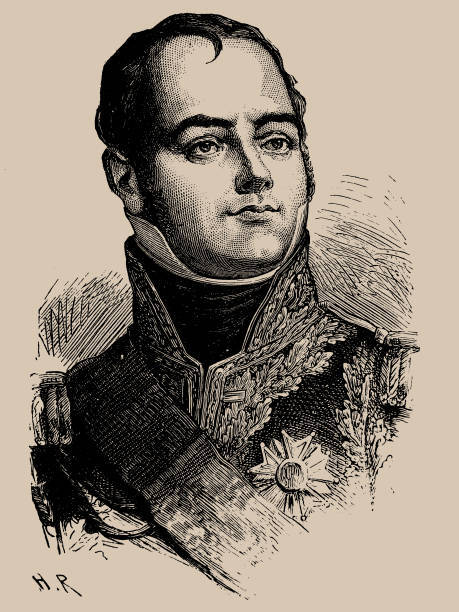
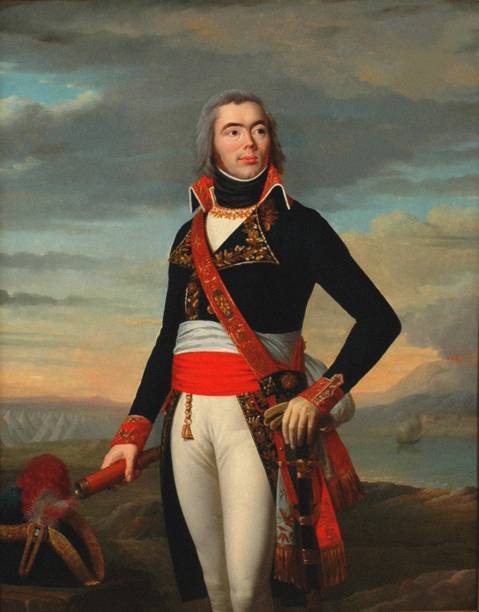
17th November 1765 saw the birth of Étienne Jacques Joseph Alexandre MacDonald at Sedan France.
This is rather a long piece about, in my opinion, a very intersting Franco-Scot. The first photo is on display at The Palace of Versaille, showing how highly the French thought/think of him.
Scots have had a long history with France, and it did not end with the French Revolution, although no doubt some may very well have become victims of the era and lost their lives and lands, others like Franco-Scot, Étienne MacDonald, would go on to show that their devotion was to France rather than to the ruler.
In 1784 the British Parliament passed the Act of Amnesty which pardoned all Jacobites, but despite this, Étienne’s father Neil MacDonald, who helped Charles Edward Stuart escape to France after the ‘45, never returned to Scotland on account of his poor health and he died in poverty 4 years later.
By this time his son Jacques MacDonald, as he was known, had already begun a promising military career in the French army, and that he would later be central to the cataclysmic events of the French Revolution, Napoleonic Wars and Restoration of the Bourbon Monarchy in France..
MacDonald began his French military career in 1786 by joining the ‘Dillon Regiment’, which was primarily composed of Scottish and Irish Jacobite exiles. The regiment remained loyal to Louis XVI at the outbreak of the revolution in 1789, which led not only to its disbandment in 1791, but the execution of its Colonel, Arthur Dillon, by guillotine in 1794. MacDonald on the other hand was personally loyal to the revolution, marrying a Mademoiselle Jacob, whose father was an enthusiastic supporter of the changes that were taking place in French society.
At the outbreak of war in 1792 MacDonald continued to serve in the new army and was offered a prestigious position as aide-de-camp to General Dumouriez. He distinguished himself at the Battle of Jemappes,and he was also present alongside Dumouriez at the Battle of Valmy. The victory of the French volunteer army at Valmy was a significant turning point in the Revolutionary Wars and it compelled France to formally abolish the monarchy shortly afterwards. By 1793 MacDonald had risen to the rank of Colonel and then refused to desert the Revolutionary Army when Dumouriez defected to the enemy. As a reward for this loyalty he was given the command of a Brigade.
By 1797 he had become a General of a Division and joined the French Army in Italy. He occupied Rome, became the governor of the city, defeated the Austrian Army of General Mack before reorganising the Kingdom of Naples into the Parthenopaean Republic. In 1801 he became the French ambassador to Denmark but did not enjoy the politics of diplomacy and he later asked to be recalled.
After returning to France, it was clear the French Republic was in crisis. Its armies were being outfought by a coalition of empires determined to destroy revolutionary ideas. Internally, France had become politically unstable and a coup d’etat was planned to overthrow the government. It was decided that a general should be part of the coup to ensure the support of the army. The conspirators first choice, General Joubert, was killed in Italy before he could be asked. General Moreau was then asked, but he refused to be a figurehead of the coup. The decision then came to MacDonald himself, and like Moreau before him, he also refused. The next choice for the conspirators was Napoleon Bonaparte, who accepted the offer and took power backed by the army and MacDonald.
Following these events, MacDonald took command of the French Army of Switzerland, an important position that linked the French armies fighting in Germany with those in Northern Italy. He fell out of favour with Napoleon after associating with his rival, General Moreau. This led to Napoleon overlooking MacDonald in his first allocation of Marshals of France around 1805.
The Napoleonic Wars continued from 1805 but MacDonald still remained without a position in the French Army. It wasn’t until 1809 that Napoleon finally allocated command of a Corps to MacDonald, also giving him the responsibility of being a military adviser to Napoleon’s adopted son, Prince Eugene de Beauharnais, the Viceroy of Italy.
The highlight of MacDonald’s career soon followed at the Battle of Wagram in 1809. MacDonald was in command of the reserve corps, and at the height of the battle he was ordered to attack the Austrian centre to relieve pressure on the other parts of the French line. Forming his 8,000 soldiers into an unusual column formation that resembled a large hollow rectangle, MacDonald advanced and successfully held off three Austrian cavalry charges. Under concentrated Austrian cannon and musket fire his Corps suffered 50% casualties and could not advance any further. MacDonald recognised that the Austrians were now disorganised because of his attack, and he ordered the French Guard Cavalry to attack and seize the opportunity to destroy the Austrian centre. General Walther, commander of the Guard Cavalry, refused to take an order from anyone other than Napoleon himself and his cavalry remained stationary. This crucial delay resulted in a lost opportunity to capitalise on the gains that MacDonald had made. Both MacDonald and Napoleon were later furious with General Walther for this decision, Napoleon even being moved to say that it was the first time his cavalry had ever let him down.
Despite the failure of the Guard Cavalry, MacDonald’s attack had sufficiently occupied the attention of the Austrians to allow the French to successfully conduct a general attack on other parts of the line. The French had won the battle and Napoleon rode directly to MacDonald and upon embracing him said,
“General MacDonald, Let us be friends henceforth. You have behaved valiantly and have rendered me the greatest services throughout the entire campaign. On the battlefield of your glory, where I owe you so large a part of yesterday’s success, I make you a Marshal of France. You have long deserved it.”
MacDonald was the first French Marshal to be created on the field of battle and he graciously asked Napoleon to let the rewards be distributed equally among the men of his corps. Napoleon said that he could not refuse him and in further recognition of his services he soon afterwards awarded MacDonald the Grand Eagle of the Legion of Honor, the title of Duke of Taranto and 60,000 francs.
Following the Battle of Wagram, MacDonald was made the Governor of Gratz, a role which he undertook with such distinction that the city wanted to pay him 200,000 Francs when he left, an offer which he refused. MacDonald was then made the Commander of the French army in Catalonia, and also the Governor-General of the principality. MacDonald had serious objections to the manner in which the French were fighting the war in Spain, which had degenerated into a brutal war between French regulars and Spanish guerrilla fighters. Putting aside his objections, he took up the role and met with mixed success. He was defeated at the Battle of Pla in 1811, but later took Figueras after a 4 month siege. Both of these battles were typical of the Spanish War in which large numbers of French troops and resources were tied down by relatively small numbers of elusive Spanish troops. Following the siege of Figueras, MacDonald experienced a sever case of gout, followed by fever. He asked to be transferred and returned to Paris, unable to walk without the assistance of crutches.
MacDonald recovered in time to be present at the French invasion of Russia in 1812, in which he commanded the X Corps and the left wing of the Grand Army. This Corps was a multinational formation, comprising Poles, Bavarians, Westphalians and Prussians. Initially the invasion met with little resistance and MacDonald was able to defend the flank of Napoleon’s invasion by routing a Russian Army near Riga in present day Latvia. Despite his Prussian infantry playing a major part in the victory, MacDonald started to become suspicious of them after they less than enthusiastically undertook his order to pursue and capture the defeated Russians.
After a series of battles Napoleon went on to capture Moscow, which had been completely abandoned by the Russians. After Moscow had been under occupation for three days, the city was set alight by a handful of Russians who had stayed behind to prepare the trap. The resulting fire destroyed 80% of the mostly wooden city and came as a terrible shock to the morale of the French army. Tsar Alexander continued to ignore all calls for surrender from Napoleon and with the French army now camped in a ruined city Napoleon had no choice but to retreat, which the Grand Army began in October 1812.
In November 1812 Napoleon learned that there had been a coup against his rule in Paris. Leaving Marshal Murat in command he left the army had hurried back to Paris to deal with the political problems that had arisen. Marshal Murat also later abandoned the army to save his Kingdom of Naples, leaving Napoleon’s adopted son the Viceroy of Italy, Prince Eugène de Beauharnais in command. MacDonald had previously been a close colleague and military mentor to de Beauharnais and they had worked closely together to secure the French victory at Wagram two years previously.
The French Army had initially invaded Russia with an Army of 450,000 men, but now the remaining 150,000 had the unenviable task of retreating from Moscow through a vicious Russian winter and temperatures of -40c. As the pursuing Russians picked away at the remnants of what was once the largest army in European history, MacDonald was trying to deal with problems within his own Corps. During the retreat he was shocked to discover that General Yorck and the Prussians under his command had defected from MacDonald’s Corps en masse, secretly leaving the army during the night. MacDonald wrote contemptuously of these Prussian’s in his memoirs but he spoke highly of the Polish, Bavarian and Westphalian soldiers of his Corps, who he described as serving faithfully, courageously and with distinction.
During the final stages of the retreat, Marshal Murat requested the advice of MacDonald on how the French Army should proceed. MacDonald recommended abandoning all territory east of the Oder River, holding the line along the river and waiting for the fresh troops being assembled in France. His advice was ignored and the retreat would continue. The total losses during the whole campaign amounted to 380,000 men, with just 35,000 Frenchmen making it home from the initial force.
MacDonald eventually did make it back to France, despite having his travelling expenses of 12,000 francs stolen from him on his way through Prussia. He received a frosty reception from Napoleon when he eventually returned to Paris. The Emperor had been led to believe that the Prussians had deserted the army because MacDonald had treated them badly. In his memoirs MacDonald also suggests that this less than cordial meeting was because Napoleon felt resentment towards his plan of abandoning all territory East of the Oder River. MacDonald left the meeting bemused and with understandable disdain that his services and devotion were met with such a lack of appreciation. However some days later, news had reached Napoleon that the Prussian Government had fully accepted the actions of their soldiers, implying that the desertions had nothing to do with the way MacDonald treated them and everything to do with an imminent Prussian declaration of war against France. He was subsequently summoned by Napoleon, who admitted that he had been misled regarding MacDonald’s actions in Russia, and that he did in fact act wisely in his dealings with the Prussian soldiers of his command.
By 1813 MacDonald was back in the field, joining the 200,000 largely inexperienced soldiers that were sent to link up with the remnants of the French Army in central Europe. A new coalition of powers, including Prussia, had rallied together to defeat Napoleon following his disastrous invasion attempt of Russia.
In the aftermath of the Battle of Leipzig, MacDonald and Prince Poniatowski of Poland were given command of a desperate rear guard action. Hopelessly outnumbered, MacDonald and Poniatowski made a fighting withdrawal through Leipzig towards a bridge across the river Elster. Learning that the bridge had in fact been destroyed by the French in the confusion of the retreat, Poniatowski attempted to swim across the river on horse back. He made it across, but the bank was steep and his horse fell with exhaustion, drowning Poniatowski in the river. As the front disintegrated MacDonald found himself being followed by a crowd of his men desperate to escape the approaching enemy. Seized by his aide-de-camp, MacDonald found a makeshift bridge of wooden logs that had been hastily constructed by a resourceful French engineer. MacDonald dismounted and began walking across the flimsy construction, but as his men began to follow him the bridge began to shake, causing MacDonald to fall into the river. Luckily he fell close enough to the shore that his feet could reach the bottom of the river but he struggled to get out because of the loose soil and steep embankment. Enemy skirmishers fired on him at point blank range before they were scared off by French musket fire on the opposing river bank.
MacDonald barely escaped with his life and upon reaching the top of the riverbank he turned to see whole companies of his men falling into the river, crying out “Marshal! Save your men, save your children!” as they were swept away to their deaths. Overcome with rage and frustration at being unable to save his men, he sat on the riverbank and wept. MacDonald recalls in his memoirs that this scene traumatised him for years after the event and that he could often hear the voices of the screaming men ringing in his ear.
MacDonald was furious with Napoleon for allowing the whole disaster to happen and he initially refused to even meet with the Emperor. Rumors subsequently spread through the army that MacDonald had been killed while crossing the river, but he survived and eventually made his way to Cologne to rebuild his shattered Corps. He remained one of the central commanders of the now hopeless French efforts to keep the allied powers from entering France. Ultimately Paris was captured by the allies in 1814. As Napoleon raced to Fontainebleau it was clear the soldiers were no longer willing to follow Napoleon on what was obviously a lost cause. MacDonald was encouraged to approach Napoleon on behalf of the army, making him aware that the soldiers wanted peace. MacDonald made these points to Napoleon at Fontainebleau, expecting the Emperor to fly into a violent rage, but was surprised when Napoleon reacted quite calmly to the fall of Paris and the reality that the starving and worn out remnants of the army could no longer go on fighting. Napoleon hailed MacDonald as a “good and honorable man” for his frankness and openness. He then turned to all those in the room and announced that he would abdicate the throne in favour of his son. Napoleon sat and wrote out his abdication, rewriting the draft two or three times. Then as Napoleon dismissed them for the evening, he threw himself on the sofa, slapped his leg with his hand and proclaimed, “Nonsense, gentlemen! Let us leave all that alone and march tomorrow, we shall beat them!” No doubt bemused by this departure from reality, MacDonald reiterated everything he had already said about the perilous state of the army. The Marshals, led by Marshal Ney then decided to mutiny against Napoleon to prevent further pointless bloodshed. Napoleon eventually yielded to the inevitable and MacDonald, along with Caulaincourt and Ney, left to personally negotiate the terms of surrender with Tsar Alexander of Russia on behalf of Napoleon.
MacDonald was to write that Tsar Alexander was gracious in victory and spoke respectfully of the French. MacDonald notes in his memoirs that aside from Marshal Ney, who was unstable and aggressive, Tsar Alexander’s conciliatory tone was reciprocated by the French Marshals. The Prussians were far less accommodating and were quick to remind the French that they were the scourge of Europe, immediately demanding compensation and providing none of the compliments that the Tsar had generously offered the French army. The other main member of the allied coalition was Austria, who was willing to allow Napoleon’s wife and son to keep their titles, but on the condition that they were prohibited from ever attaining power in France. Britain refused to negotiate at all, claiming that they did not recognise Napoleon as a legitimate authority, which was probably just as well for Napoleon who half heartedly said that you could “never trust a MacDonald within sound of bagpipes.”
Following the exchange, the allied powers were keen to ensure that the Marshals submitted to the new order. This would guarantee that the French Army would also obediently submit to the provisional government. Marshal Ney immediately submitted, but MacDonald and Caulaincourt remained loyal to Napoleon until the formal ratification of the treaty, after which time MacDonald wrote a simple statement to the provisional government saying that “being released from my allegiance by the abdication of the Emperor Napoleon, I declare that I conform to the Acts of the Senate and the Provisional Government.” This act of dignified defiance infuriated the ever scheming French statesmen de Talleyrand, whose face was said to turn pale before almost bursting with rage when MacDonald politely refused to submit until the formal ratification of the treaty.
MacDonald returned to Fontainbleu to call upon Napoleon. On the morning of the 13th of March 1814, MacDonald entered to find a despondent Napoleon wearing his dressing gown and slippers, with his head buried in his hands and his elbows on his knees. He did not stir when MacDonald entered the room, but on prompting from Caulaincourt he appeared to wake from a dream and MacDonald found him to have a sickly yellow-green complexion. Napoleon apologised and said that he had been sick all night, later evidence suggests that it was likely Napoleon had taken an overdose of opium in an attempt to try and sleep after the emotionally exhaustive events of recent months.
Again, Napoleon sat in the room, remained silent for a period of time before turning to MacDonald and saying,
“Duke of Tarentum, I cannot tell you how touched and grateful I am for your conduct and devotion. I did not know you well; I was prejudiced against you. I have done so much for, and loaded with favours, so many others, who have abandoned and neglected me; and you, who owed me nothing, have remained faithful to me I appreciate your loyalty all too late, and I sincerely regret that I am no longer in a position to express my gratitude to you except by words.”
Napoleon noted that MacDonald had always had a generous manner, never accepting large amounts of money while being an impartial ruler who brought justice wherever he commanded. Napoleon then implored MacDonald to accept the sword of the former leader of the Mamelukes, Murad Bey, which had been captured in Egypt in 1798 and worn by Napoleon at the Battle of Mount Tabor in 1799. MacDonald accepted the gift as a sign of Napoleon’s friendship and the two commanders emotionally embraced each other. It was the last time that MacDonald and Napoleon would ever meet.
I think I’ve taken this as far as I want to for this lengthy post, but there is much more to read in part two just click here!
When he died in 1840 at the age of 70 he was given a state funeral and buried in the Pere Lachaise cemetery in Paris. Pere Lachaise is where the great and good of early nineteenth century Paris were buried. 14 of Napoleon’s 26 Marshals are buried there.
Somhairle MacGill-Eain/ Sorley MacLean, wrote a poem about Marshal Étienne Jacques MacDonald of France, I shall post that later.
There are more pics in the article I took this from here https://sonofskye.wordpress.com/.../marshal-etienne.../
8 notes
·
View notes
Text
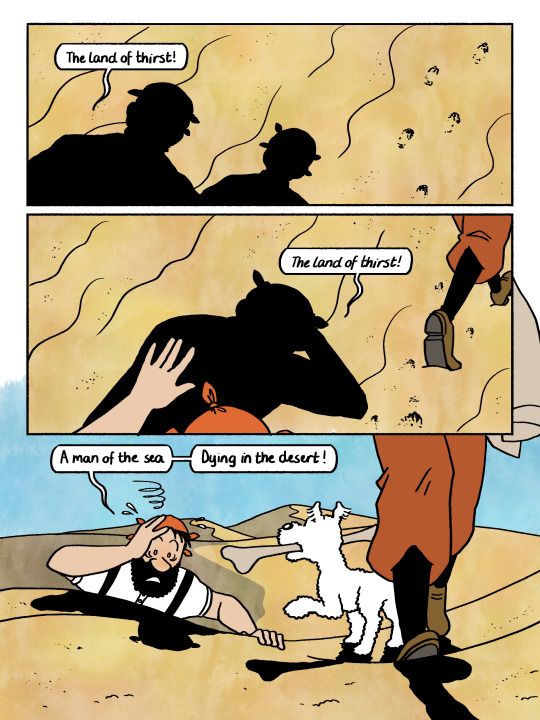
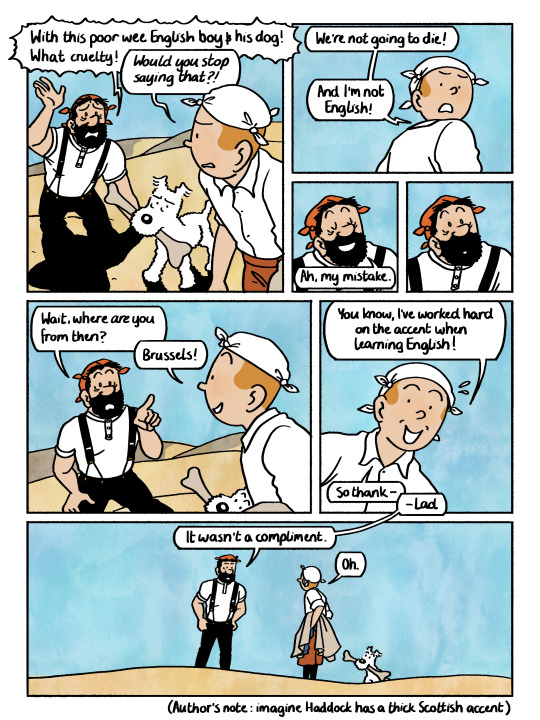
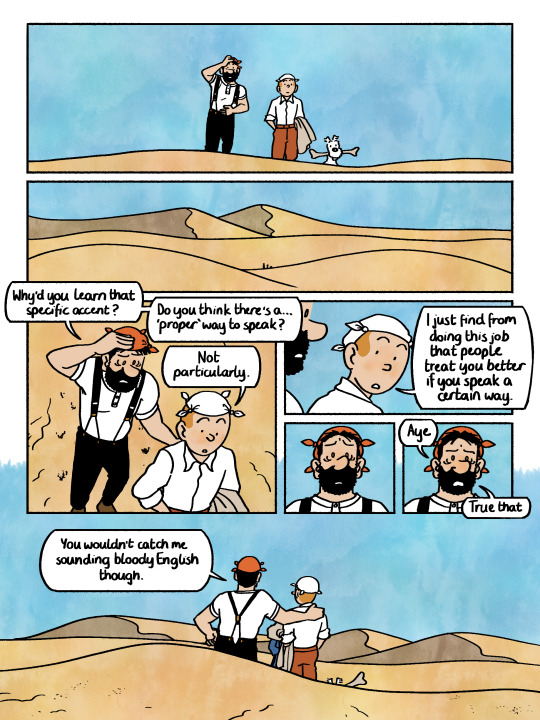
I remember discussing Tintin casting choices with a friend from Germany and remarked how it was odd he often has an English accent in adaptations rather than a Belgian one, and my friend just replied "that's because Tintin gives incredibly strong English boy energy (derogatory)"
Here in the UK there's a lot of weird classism tied into accents. Today accent diversity and representation in broadcasting is actively pursued but in Tintin's time there certainly was a preferred accent to have.
imagine this exchange happens between pages 28-29 in The Crab with the Golden Claws
#tintin#adventures of tintin#comic#captain haddock#archibald haddock#snowy#milou#fanart#the crab with the golden claws#i remember tintin crafting a trumpet to communicate with an elephant#and he remarks he must get the accent correct#very odd scenario but it shows he would be a stickler for that sort of thing#i also have to say accents do not indicate how smart someone is#a lot of pundits use an english accent to sound more credible#but i have to say there are a lot of fucking idiots here#me included#thank you 2011 film for validating my scottish haddock headcanon#any french speakers who have read to this point i wonder what your hcs are for his french speaking accent
13K notes
·
View notes
Text
"British Wild" this and "Scottish Wild" that
Guys hear me out on giving Wild the most outrageous French accent. The single French outlier in the chain. The single French man in the royal guard pre calamity.
I've just gone full circle and I am spit balling accents in the general European area but you have to be aware if you give Wild the French accent then Warriors has to be Scottish. Wild is French then Warriors has to be Scottish, Time and Twilight are still southern but Four has to be obnoxiously midwestern. I don't make the rules guys, I just enforce them
#linked universe#linked universe au#accents#im spitballing accents#french Wild propaganda#but also Scottish Warriors#midwest Four#trust me guys he'd be midwestern but not the nktmal midwest he'd be the midwest emo Midwest#lu wild#lu warriors#lu four#linked universe headcanons#headcanons
94 notes
·
View notes
Text
Not people trying to act like Elain means God answered me when they're literally changing the name to make it fit 🤦

Eliana is not what Sarah chose for her.




Gwyn = Blessed, Happy
Azriel = God is my help
Elain and Lucien = Light ☀️
#elucien#elain archeron#lucien vanserra#anti e/riel#gwyneth berdara#azriel actoar#azriel shadowsinger#gwynriel#Welsh French or Scottish - Elain means Light#Elain is not a true Hebrew name#In Hebrew you need the Eli part and Anah part to get a name that translates to God has answered me#Literally any name website will tell you Elain is a variation of Elaine and means light#None of it matters anyway because Sarah said Elain took she and Lucien by surprise after she named them#It's just cool how well it worked out after all her hints of her needing sunshine#And it's Gwyn who is a Priestess which matches Az's name 🤷
96 notes
·
View notes
Text

British soldiers make the arduous ascent of the Heights of Abraham to take Quebec, 1759 by Peter Jackson
#peter jackson#art#north america#quebec#canada#british#english#canadian#soldiers#heights of abraham#british america#history#seven years war#french and indian war#james wolfe#british empire#great britain#england#general james wolfe#plains of abraham#boats#cannons#scottish#scaling the heights of abraham#scaling#climbing
86 notes
·
View notes
Text
Time Travel Question : Murder and Disappearance Edition I
Given that Judge Crater, Roanoke, and the Dyatlov Pass Incident are credibly solved, though not 100% provable, I'm leaving them out in favor of things ,ore mysterious. I almost left out Amelia Earhart, but the evidence there is sketchier.
Some people were a little confused. Edward V and Richard of Shrewsbury are the Princes in the Tower.
#Time Travel#Famous Murders#Jack the Ripper#La Bete du Gevaudan#Gandillon Family#Werewolves#William Rufus#King William II#Edward V#Richard of Shrewsbury#French History#English History#Early Modern Europe#Victorian England#Lord Darnley#Mary Queen of Scots#Scottish History#Amy Robsart#Lord Dudley#The Sodder Children#The Somerton Man#Australian History#Prime Minister Harold Holt#Elizabeth Short#The Black Dahlia
510 notes
·
View notes
Text

Annie French (British/Scottish, 1872 - 1965) • The Flower Maiden • Pen and black ink and watercolour heightened with bodycolour and gum arabic
#illustration#art#illustrator#annie french#british/scottish illustrator#woman illustrator#watercolour illustration#works on paper#drawing#sassafras and moonshine blog
70 notes
·
View notes
Text





The Battle of Bushy Run by Robert Griffing.
On August 5 1763, near the Bushy Run Way Station, Henry Bouquet and his 400 men, many of them Scottish highlanders, were ambushed in the wilderness by various Native American tribes including the Delaware, Shawnee, Mingo, Wyandot, Miami, Ottawa, and Mohicans. The first day of the battle ended in a decisive victory for the Native American tribes, but on August 6, Bouquet devised a strategic plan that led to a British victory. Following the Battle of Bushy Run, Bouquet went on to provide successful assistance to the besieged Fort Pitt. From the Bushy Run Battlefield Museum.
#history#british army#military history#18th century#redcoat#redcoats#scotland#scottish#scottish history#highlander#highlanders#pontiac's rebellion#seven years war#french and indian war
87 notes
·
View notes
Text
making ocs in the sims is like Why Are They American
#my post#HEELLLLPPPP MY SCOTTISH GUY AND MY FRENCH/ENGLISH GUY ARE AMERICANS#a second disney princess glow up incident has hit the ocs#whitewashed white people. deculturified. bwomp
27 notes
·
View notes
Text
if you're British, and you're talking to me, you should know, in my head, there is a nonstop train whistling, "oi innit bruv oi innit bruv oi innit bruv" over and over again, and there's no end to the track. I'm sorry.
#I cant take the British accent seriously I just cant#its like listening to French people speak#you're for real?#youre not messing with me?#you know what accent I'd rather hear?#irish#scottish#indian
58 notes
·
View notes
Text

Ancient Greek híppos, Latin equus, Irish each, and Icelandic jór all mean 'horse', and Spanish yegua and Romanian iapă mean 'mare'. They're very different, yet they ultimately stem from the same Proto-Indo-European word. They drifted apart due to the sound changes they underwent.
What would their modern English, German, Dutch, French and Italian cognates look like if they had survived? I tell about it on my Patreon.
#historical linguistics#linguistics#language#etymology#english#latin#french#dutch#spanish#german#lingblr#old irish#irish#manx#scottish gaelic#celtiberian#gaulish#proto-germanic#old english#old saxon#proto-norse#old norse#icelandic#gothic#lithuanian#romanian#sardinian#old french#occitan#catalan
233 notes
·
View notes
Text

Anne French (1872-1965), 'The Picture Book', ''The Studio'', Vol. 38, #159, 1906 Source
171 notes
·
View notes
Text

Rebecca and the Wounded Ivanhoe
Artist: Eugène Delacroix (French, 1798-1863)
Date: 1823
Medium: Oil on canvas
Collection: Metropolitan Museum of Art, New York City, NY, United States
Description
This was Delacroix’s first treatment of a subject drawn from Sir Walter Scott’s popular novels of medieval chivalry. The eponymous hero of Ivanhoe (1819), straining to leave his sickbed, listens to the terrified Rebecca as she describes a battle raging outside the window. Rather than show the battle itself, Delacroix sought to stimulate the viewer’s imagination by evoking violence through the gestures of the characters reacting to it. The fastidious execution of Rebecca’s extended hand stands in contrast to the jumble of strokes immediately surrounding it and to its left, which suggest the frenzy she witnesses.
#historical scene#painting#rebecca#ivanhoe#wounded man#walter scott novel#ivanhoe novel#scottish literature#scottish novelist#scottish writer#literary scene#oil on canvas#fine art#oil painting#artwork#bed#window#costume#drapery#french culture#french art#eugene delacroix#french painter#european art#19th century painting#metropolitan museum of art
15 notes
·
View notes
Text
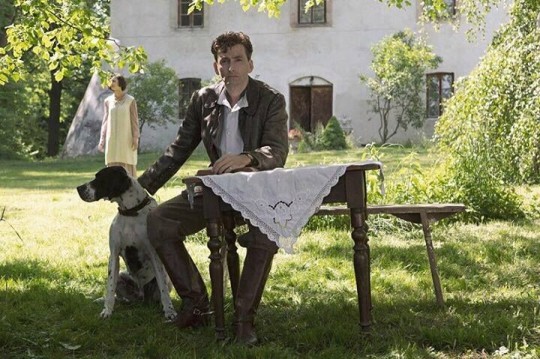


Je t'aime, Jean-François Mercier
#david tennant#david tennant in chairs#legs for days#just like all the limbs#Jean-François Mercier#spies of warsaw#good lord he's beautiful#curly hair david is a special treat#also he looks so sexy when smoking#it's gross in real but so delicious in fantasy#soft scottish hipster gigolo#playing a french military spy#with a British accent#the power of TV/movies!#honestly this show was super slow and boring but he's the right kind of sad and beautiful#the DT special as it were#i want to summit him#1930s fashion is a good look on him
85 notes
·
View notes
Text

Conquered but not Subdued by Richard Caton Woodville Jr.
#richard caton woodville jr#napoleonic wars#art#prisoner#napoleonic#highlander#highlanders#cavalry#peninsular war#british#scottish#french#spain#france#britain#great britain#scotland#england#europe#european#history#chasseurs#chasseur#hussars#hussar
158 notes
·
View notes
Text
ok hai guys pikmin time
this is it!!!! farewell again for a month!!!!
first two are from today


^^ these two are canon ty 😁





#pikmin#pikmin fanart#louie pikmin#i am louie’s number 1 defender#captain olimar#yellow pikmin#red pikmin#charlie pikmin#charlie is my fave :3#alph pikmin#please ask me about them ple#french louie#british alph#scottish charlie#boston olimar#thank you#sages art extravaganza
206 notes
·
View notes